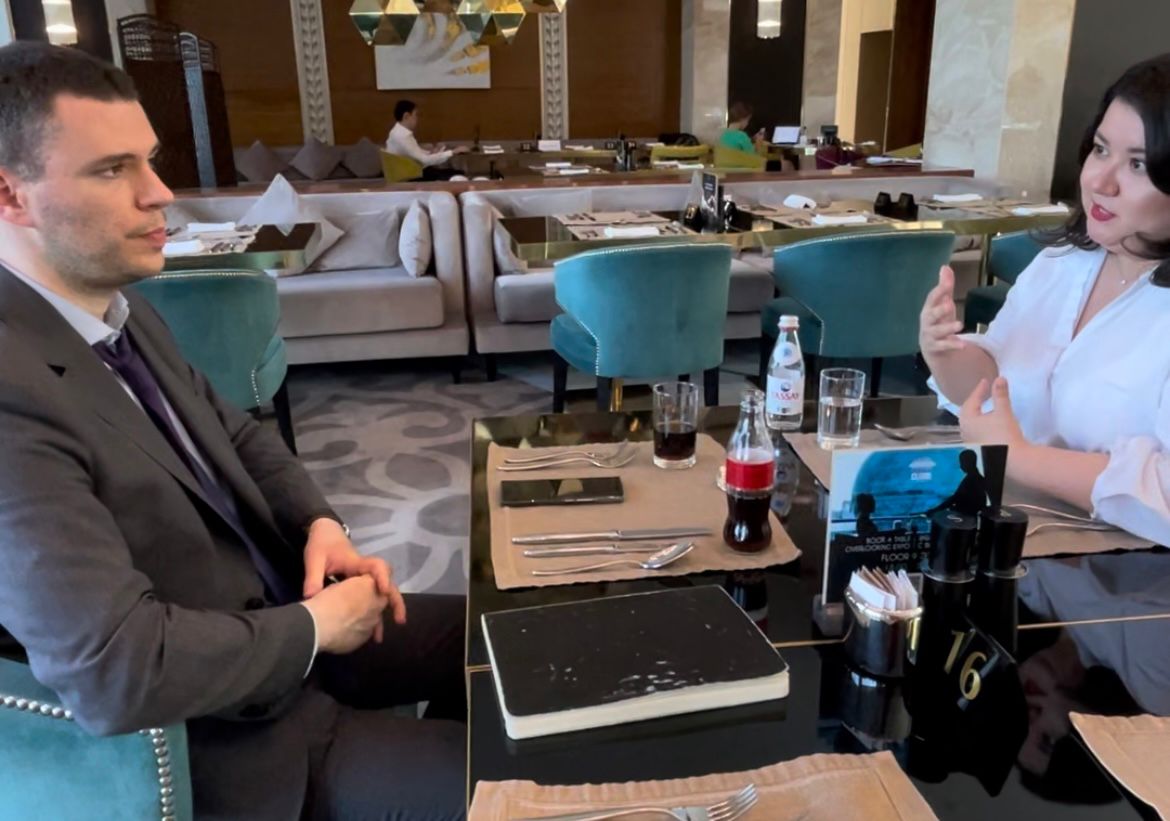ASTANA – Addressing the situation in Afghanistan remains on top of the agenda for Central Asia, said Michael Levystone, an associate research fellow at the Institut Français des Relations Internationale (IFRI) Russia/Eurasia Center, in an exclusive interview with The Astana Times. The expert, who participated in the Astana International Forum (AIF) on June 8-9, also discussed the intensifying geopolitical competition in Central Asia, regional connectivity and water scarcity.

Levystone, (IFRI) Russia/Eurasia Center, believes Afghanistan is a more important concern for the Central Asian region than Ukraine. Photo credit: The Astana Times.
According to Levystone, it had looked like Washington would lose influence in the region after the U.S. withdrew its troops from Afghanistan in 2021. However, the tragic events in Kazakhstan in January 2022, when the country faced a violent coup attempt, followed by the Russia-Ukraine conflict, provided a leeway for the U.S. to return to Central Asia.
Kazakhstan became the focal point for high-level international interactions last year, with visits to Astana from the European Union, the U.S. and China. According to Levystone, the return of the U.S. is directly related to Afghanistan, which he believes is of more critical concern for the Central Asian region than Ukraine.
“Afghanistan is still a huge problem for the region. I think it’s a lot bigger than Ukraine,” said Levystone. The U.S. presence is becoming stronger than ever since the independence of the post-Soviet states in 1991 in the Eurasian region, he suggested.
According to the expert, many ties are expanding because of the Afghanistan issue, including between Washington, Tajikistan and Turkmenistan.
China’s and EU’s involvement in Central Asia
As for China’s presence, Levystone said that in the past year, Beijing has aimed to “implement proper politics in Central Asia, not only in terms of economics but also in terms of security.” The country’s approach to the region does not rely solely on the Shanghai Cooperation Organization (SCO). However, the SCO’s main goals, such as fighting extremism, separatism, and terrorism, remain essential for China.

Levystone said Kazakhstan should also look in the direction of the International North-South Transport Corridor. Photo credit: The Astana Times.
“The SCO was a very useful framework for China to improve its relationships with Central Asia, both politically and economically. But more and more, China is moving away from it to conduct its independent policy in Central Asia without Russian interference. China invests more funds in infrastructure and transport network projects without Russia. I think this is a driving idea of what China is conducting in Central Asia,” he said.
Levystone noted the Ukraine factor is significant in terms of close attention from the EU towards the region, although the EU was already a prominent actor in Central Asia even before the Russian-Ukrainian conflict.
“Brussels [the EU] is the top trade partner for Kazakhstan, which is quite unusual in Central Asia, where either Russia or China are the main trade partners. But prior to the war in Ukraine, the EU launched a Global Gateway project worth $300 billion to develop ties in the connectivity, transport, and digital sectors. So when the Ukraine war started, it gave a new impulse to the relations. We have seen that Europe increased its trade with both Kazakhstan and Uzbekistan by 40% in a year. This is huge,” Levystone said.
However, the EU is equally concerned about the Afghanistan crisis, making it a significant aspect of the Central Asian-EU relations.
“A political dialogue is still going on between Brussels and Central Asian countries. There is much at stake today between the EU and Central Asia. Of course, there are two main issues: Ukraine and Afghanistan. Let us not forget about Afghanistan. In Europe, people underestimate [that crisis]. It is clear that what worries most the people [in Central Asia] is not Ukraine but Afghanistan,” Levystone said.
Trade route opportunities
The expert noted the Taliban takeover in Afghanistan and the Russian-Ukrainian conflict significantly impacted Central Asian connectivity in terms of transportation, energy, and water. However, like with any crisis, there are as many opportunities as there are risks to be mindful of. According to Levystone, Kazakhstan serves as a natural link between China and Europe. China fosters this role because it wishes to shift its trading routes and trade corridors from north to south.
“I think for Kazakhstan it would be important to take advantage of this shift in trade routes, in terms of connectivity, especially in the Caspian Sea. As your Prime Minister quite recently highlighted, there is a huge need to improve infrastructure at the Caspian Sea ports and attract more investments,” Levystone said.
He suggested Kazakhstan should also look in the direction of the International North-South Transport Corridor, a 7,200-kilometer-long multimodal network of ship, rail, and road routes connecting India, Iran, Azerbaijan, Central Asia, Russia and Europe.
“This huge, multimodal transport corridor project should theoretically connect Russia to India through the Caspian Sea, Iran. We know Kazakhstan is getting more attracted to the southern Iranian ports. I think there are a lot of things happening today around Kazakhstan,” Levystone said.
Water scarcity in the region
Levystone also noted water remains the most polarizing topic in Central Asia despite the urgency.
In his address at the AIF, President Kassym-Jomart Tokayev referred to the critically low water level in the two great rivers of Central Asia – the Syr Darya and the Amu Darya – which could decrease by nearly 15% by 2050. The President called for “more resources to support the International Fund for Saving the Aral Sea to prevent an ecological catastrophe in the region.”
When asked what role Kazakhstan can play in bringing the region together to address this issue, not just on paper but via concrete steps, Levystone candidly said he does not think Kazakhstan is the primary actor in this issue.
He suggested the initiative should come more from Uzbekistan, because Kazakhstan is significantly less reliant on foreign water sources than Uzbekistan or Turkmenistan.
“There are challenges in Xinjiang for Kazakhstan, as China is building more hydroelectric dams there. Of course, it impacts eastern Kazakhstan and Balkhash [a lake in southeastern Kazakhstan]. I do not think Kazakhstan is the key driving force here. It should be coming from Uzbekistan, which is moving in a good direction since [President of Uzbekistan] Mirziyoyev came to power in 2016. He endeavored to reset political dialogue with the Kyrgyz Republic and Tajikistan, which was far from simple at that moment,” Levystone concluded.

